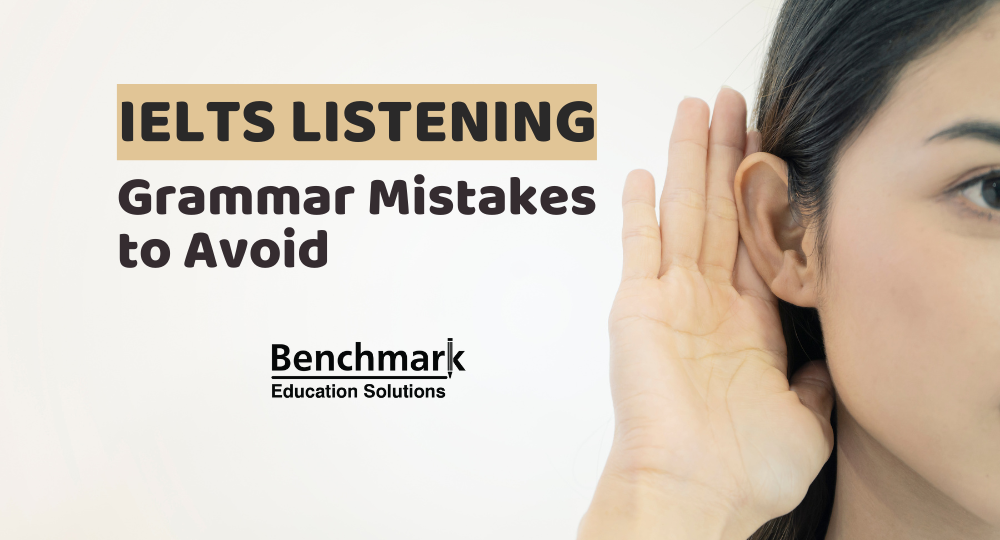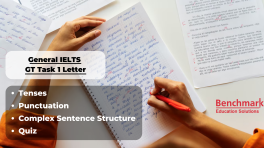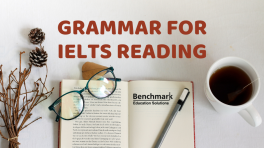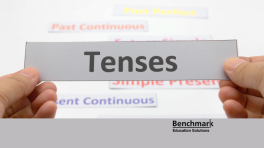Grammar Mistakes in IELTS Listening
- 0 Comments


IELTS listening checks the candidate’s ability to understand key information. This requires more than just a good ear and decent vocabulary. In order to fully comprehend what is being said, a candidate needs to have knowledge of key grammar areas.
Table of Contents
1. Key Grammatical Concepts for IELTS Listening
Let’s delve into the main grammatical areas for the IELTS listening section that you need to master to ensure you write the answers down correctly. Take a look at the question types that require a good understanding of each grammar concept to avoid making any unnecessary mistakes.
1.1 Punctuation and spelling
This isn’t exactly something that can be heard over a recording; however, when a word is misspelt or not capitalised when it should be, your answer would be considered incorrect.
The name of a street, person, store, etc. will always be capitalised. This kind of information will commonly be asked in a table completion question, so make sure you use the appropriate punctuation.
Example 1: Punctuation
Audio script:: “The event will start at 9:30 AM on Friday.”
Complete the Sentence:
The event will start at _______
Incorrect Answer: 9:30 AM, on Friday
Correct Answer: 9:30 AM on Friday
Example 2: Spelling
Audio script: “The address is 15 Baker Street.”
Complete the sentence: The address is ____________.
Incorrect Answer: 15 Beker Street
Correct Answer: 15 Baker Street
Question Types: Form completion, Note completion, Table completion, Summary completion, Short-answer questions
1.2 Active vs passive voice
This affects what emphasis is placed on. Apart from the tone, you can use the sentence structure as an indication of what is most important in the dialogue. Understanding that
Learn more about active passive sentence structures on the IELTS Benchmark website.
Example
Active: Audio script: “The chef prepares the meal every evening.”
- emphasis is on “the chef” performing the action.
Passive Voice: Audio script: “The meal is prepared by the chef every evening.”
- emphasis is on “the meal” receiving the action.
Question Types: Sentence completion, Summary completion, Short-answer questions
1.3 Singular Plural nouns
This is a common mistake made among candidates. Unfortunately, your answers need to match exactly what is said in the recording to be correct. For this reason, if you write down the singular version of the noun when the recording gives the plural, it would be considered incorrect.
Example
Audio script: “Please ensure that all equipment is checked before use.”
Complete the sentence: Make sure that the ____________ is tested prior to using it.
Incorrect Answer: equipments
Correct Answer: equipment
Question Types: Form completion, Note completion, Table completion, Summary completion
1.4 Word types
Being able to identify various kinds of words, like nouns, verbs, adjectives, etc., can be used to your advantage when approaching the listening section.
When you’re given some time to read over the questions before the recording is played, try to predict what type of word would need to be filled in the missing space.
By knowing what to listen out for, it becomes a lot easier to identify key information in the recording and lowers the risk of missing anything important.
Example
Audio script: “Remember to bring a pen and notebook with you to the meeting.”
Complete the sentence: Employees are reminded to bring their notebook as well as a ____________ to the meeting.
Prediction: The missing word is likely a noun because it follows “a.”
Question Types: Sentence completion, Note completion, Table completion, Flow-chart completion, Summary completion
1.5 Tenses
Understanding the different tenses is essential to being able to comprehend the recordings. It helps you identify the sequence of events as well as spot any future predictions.
This would come in handy when given a flow chart to complete, a sentence completion question, or when asked for short answers.
Example
Audio script: “Before the meeting started, the team had reviewed all the documents. After the discussion, they made a decision. Finally, they had implemented the new strategy by the end of the week.”
Complete the flow-chart:
The team 1.__________ all the documents before the meeting started. After the discussion, they 2.__________ a decision.
Incorrect: 1. reviewed; 2. will make
Correct: 1. Had reviewed; 2. made
Question Types: Sentence completion, Flow-chart completion, Short-answer questions
1.6 Modal verbs
They often indicate the speaker’s attitude or the level of certainty about an event, which can be critical in understanding instructions or advice in the listening test.
Key Modal Verbs and Their Uses:
- Should: Gives advice or recommendations.
- Can: Indicates ability or permission.
- Could: Shows past ability or polite possibility.
- Might: Suggests a possibility or uncertainty.
You can explore other modal verbs and further examples on the Benchmark IELTS website.
Example
Audio script: “You should submit the report by Friday.”
Question: What does the speaker recommend?
- A) Submit the report by Friday
- B) Wait until next week
- C) Check the report again
- D) Discuss the report with a colleague
Correct: A) Submit the report by Friday
Question Types: Multiple choice questions, Matching questions, Summary completion, Sentence completion, Short-answer questions
1.7 Conditionals
Conditionals express possibilities and hypothetical situations. They often start with “if” or “when.” The various forms you might come across are zero, first, second, and third conditionals.
Recognising these helps in understanding the scenarios and potential outcomes discussed in the recordings.
Example
Audio script: “If you complete the form by Friday, you will receive a discount.”
Question: What will happen if you complete the form by Friday?
- A) You received a discount
- B) You will receive a discount
- C) You would receive a discount
- D) You had received a discount
Correct: B) You will receive a discount
Question Types: Multiple-choice questions, Matching questions, Sentence completion, Summary completion, Short-answer questions
1.8 Articles
The most important rule is to write down exactly what you hear, and usually, if you hear an article in front of a word, you should include it in your answer.
However, for diagram completion, flow charts or filling in the table, you will most likely not need to write an article. Whereas for a short answer or summary completion, you will almost certainly need to add those articles.
Another useful tip if you’re in doubt is to look at the other words within the chart/table and match the grammar being used. If the other words have articles, you’ll probably need to include them in your answer as well.
Example
Audio script: “The report was submitted to the manager last Friday.”
Complete the summary: The report was submitted to _______ last Friday.
Incorrect Answer: manager (missing the article “the”)
Correct Answer: the manager (including the article “the” as heard)
Question Types: Form completion, Note completion, Table completion, Diagram labelling, Summary completion, Short-answer questions
1.9 Subject-verb agreement
Ensuring that subjects and verbs agree in number is crucial for accurate answers. Especially when doing sentence completion, if you’re filling in a missing verb, double-check the subject of the sentence to confirm whether you should add an s to the end of the verb or not.
Example
Audio script: “Each of the employees receives a bonus at the end of the year.”
Complete the sentence: Each of the employees __________ a bonus at the end of the year.
Incorrect: receive
Correct: receives
Question Types: Multiple-choice questions, Matching questions, Sentence completion, Summary completion, Short-answer questions
2 Additional Listening Tips
- Apart from understanding the grammar rules, familiarising yourself with different accents is just as important to understanding what is being said in the recordings.
- There might be a couple of informal slangs or collocations, but by watching tv-shows in English or listening to a variety of podcasts and audiobooks, you can get to know different phrases.
- When writing down your answers, it’s crucial to write them exactly as the speaker in the recording says them.










